“Towards Common Security in East Asia”
| Date: | Saturday, January 31, 2015, 14:30-16:30 |
|---|---|
| Venue: | Shinagawa Prince Hotel, Main Tower 28th floor “Emerald” |
| Moderator: | Kiichi Fujiwara (University of Tokyo) |
| Speakers: | G. John Ikenberry (Princeton University) Chung Min Lee (Yonsei University) Jia Qingguo (Peking University) |
| Open to All: | Registration |
| Language: | English/Japanese simultaneous translation |
| Organized by: | Security Studies Unit, Policy Alternatives Research Institute, The University of Tokyo |
| Co-organized by: | Japan-US Alliance Agenda Network |
※ This workshop was organized by subsidies both from the Ministry of Foreign Affairs and Center for Global Partnership, Japan Foundation.
Workshop on the Future of Security - Report
The Security Studies Unit (SSU) and the Policy Alternatives Research Institute of the University of Tokyo were delighted to organise and host the Workshop on the Future of Security held at the Shinagawa Prince Hotel (Tokyo), on January 30-31, 2015. The event was made possible by the kind support of the Japan Society for the Promotion of Sciences, and saw the participation of very distinguished scholars from Japan, China, the United States, Europe, Australia, Korea, and Singapore.
The workshop extended over two consecutive days with five closed sessions and a public session entitled Towards Common Security In East Asia.
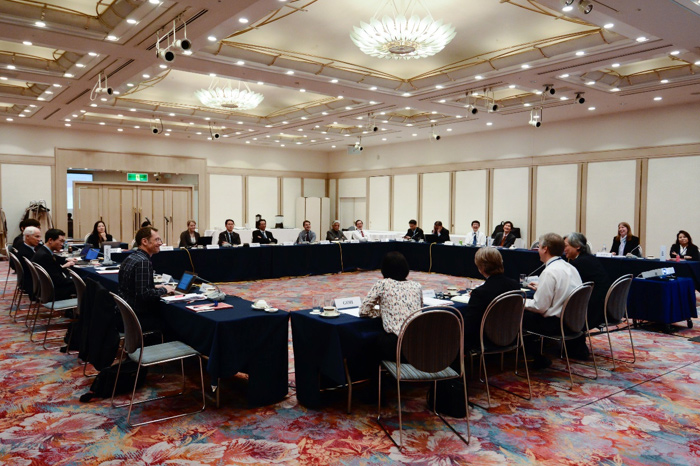
Photo: Izawa Hiroyuki
DAY 1, 30th January 2015
The workshop was opened by Kiichi Fujiwara, Professor of International Relations at the University of Tokyo and Director of the SSU, who thanked the participants and the Japan Society for the Promotion of Sciences for making the event possible. He recalled the experience of the 2014 Shinagawa workshop, remarking its success but also its more “orthodox” format in comparison to this year’s event, which would include a more unusual focus on the one hand on the broader concept of security, and on the other on the international instability generated by fragile states. After briefly describing the structure of the workshop and the programme for the successive day, Professor Fujiwara proceeded to introduce Ole Wæver, Professor of International Relations at the Department of Political Science, University of Copenhagen, and Director of the Center for the Resolution of International Conflicts, as the first speaker to address the workshop attendees.
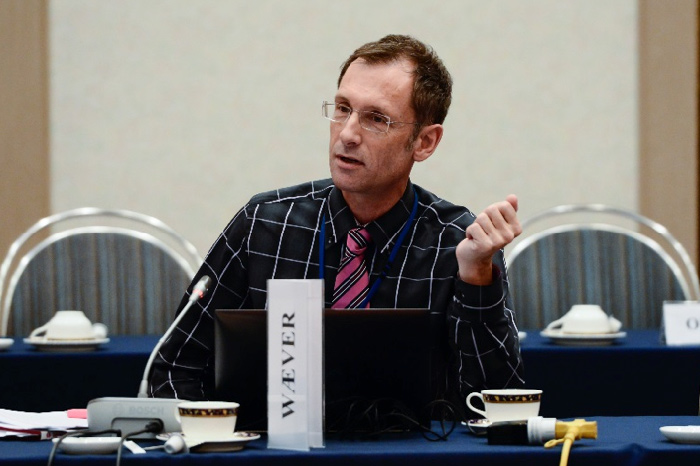
Professor Wæver delivered a speech entitled Defining Security, in which he traced the evolution and the possible future trajectory of the concept of security as it has been used, more prominently after the Second World War, in the field of international political studies. While discussing “the future of the security”, three different things can be meant, namely the security of the world (in “classical” military-political terms), the future of “security” as a concept, or the future of security studies. On this third point professor Wæver sees no future for the classical conception of security, and indeed envisages the overcoming of the label itself in the next future. Reconstructing the history and the trajectory of the security discourse, he highlighted firstly how security, which emerged as a foreign and military policy concept in the period after WWII, entered a period of semantic expansion and critique, being broadened beyond the confinements of a “state security” conception, but thus losing at least part of its explanatory power (traditionalists/wideners debate).
The “Copenhagen School of International Relations” contributed to this debate by suggesting to go beyond security by replacing it with the idea of “securitisation”, namely a process whereby “an issue is presented as an existential threat to a designed referent object requiring extraordinary measures and justifying actions outside the normal bounds of political procedure”. Within this definition, the key elements are the “reference object”, whose survival is paramount; the securitizing actor, the one which advances the claim with reference to the existence of a threat (usually the state); the audience, i.e. those who need to be convinced of such narrative. From this picture, it emerges that a key factor in the transition from “security” to “securitisation” is the conceptualisation of the latter as a “speech act”. The study of the securitisation process is consequently the investigation of the relation between the threat and the way the threat is being discussed, and even more importantly, the way in which political events are “securitised”, or whether some event should be “securitised” or not.
Professor Wæver also pointed out how securitisation is always about the future, about the evaluation of different scenarios of action and inaction. He then returned to the historical trajectory of the security concept, underscoring how what has emerged as security in the last few decades absorbed previously prevalent discourses of raison d’tat and necessity. “Risk” has been an increasingly fashionable way of articulating security concerns. Risk is defined as the possibility of largely self-inflicted harm, as opposed to an externally generated one, which is defined instead as “danger”. Risk is becoming a more central analytical tool primarily as a consequence of technological and economic development, whereby the human environment is increasingly shaped by anthropic forces, rather than “natural” ones, something which sociologists have captures in their conceptualisation of advanced industrial societies as “risk societies”. The point would be to design policies under a risk-based re-definition of political questions, but this, professor Wæver argued, appears exceedingly problematic, and the classical problems previously covered by the “security” umbrella term are unlikely to be totally subsumed in risk. This is mainly due to instability of “risk” as a concept, which may entail fundamentally different logics. Alternatively, political questions may be addressed by means of a conceptual trilogy: threat, risk, and uncertainty. Each concept points to a different foundation for policy-making: threat “justifies all necessary means to avoid what must not happen”; risk “calculates probability and consequences; predicts, plans and balances”; uncertainty “conducts beyond predictability and calculation”. Each leads to a different speech act, namely “securitisation”, “riskification”, and “uncertainty-making” respectively. Professor Wæver has then brought several examples of how current outstanding issues (climate change, global terrorism, etc…) can be seen through this scheme. Finally, he has however also identified a risk of depoliticisation every time a political question goes through the process of seeming “a-political” expert-driven processing.
Session I: Security as Risk Management
This session was chaired by Professor Fujiwara, who introduced Professor Hideaki Shiroyama, Dean of the Graduate School of Public Policy (GraSPP), as the next speaker, to be followed by Dr. Yee Kuang Heng, Project Professor at GraSPP and Associate Professor at the Lee Kuan Yew School of Public Policy, National University of Singapore.
Professor Shiroyama illustrated the rationale of his presentation as the re-formulation of “security as risk management”, exploiting the overlap between the semantics of “security” and “safety”, from which the employment of risk management discourses and procedures becomes possible. Indeed, up to the present time risk management, a concept which is heavily indebted to engineering and other technical disciplines, has not been envisaged as a tool for the analysis of international political questions in a systematic way. Professor Shiroyama has argued that the simultaneous broadening of the standard risk conception into more expanded forms of “complex” or “systemic risk”, and of the standard security conception with the encompassing of non-traditional threats, opens the way for new research trajectories. These are to be identified primarily in the application of risk approaches to security by means of an accurate study for the quantification of risk associated to the intention of the actors. The study of such risk and security overlap may entail great implications for the analytical methodology of public policy studies itself, at a time when the foundations of risk approach are undergoing a wave of revision.
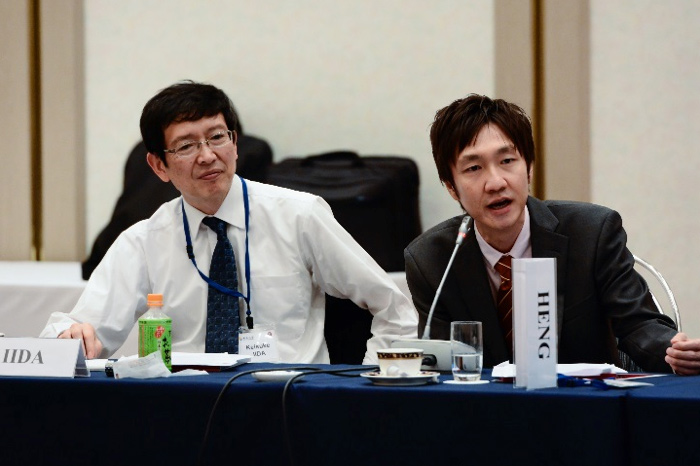
Dr. Yee Kuang Heng, linking up to Professor Shiroyama’s presentation, has explored the rise of risk, and especially of “risk management” as an emergent approach for the study of international politics and for the formulation of the related policies. In particular, he reminded the audience about the increasingly prominent position which numerous sociologists, most famously Ulrich Beck in his 1992 work on Risk Society, have dedicated to the role of risk taking and management in advanced industrial societies. Dr. Heng highlighted once more not only the inherent ambiguities of this category, but also its dualistic nature of analytical and normative concept, as well as its orientation towards an unavoidably uncertain future. He has then offered a series of insights in the way in which risk has entered international politics debates, particularly after the end of the Cold War, in a period in which traditional forms of military-political hostility were greatly diminished, and as a result an intense feeling of uncertainty regarding the nature of threats to security started to spread. Considering and evaluating different threats within a number of scenarios, policy makers have since learned ways to re-phrase their policies in terms of risk management, a fact that Dr. Heng illustrated with several examples from the past two decades. He eventually pointed to the growing relevance of risk management approaches in Western policy-making, where several countries have produced nation-wide risk assessment documents, which is now becoming an instrument in Asian countries as well, such as Singapore, and under development in Japan.
Session II: Fragile States and International Security
Professor Fujiwara introduced the speakers of the session, Professor Aila Matanock from the Department of Political Science of the University of California, Berkeley, and Professor Chiyuki Aoi, from the School of International Politics, Economics and Communication of the Aoyama Gakuin University (Tokyo), as outstanding scholars who have contributed to the understanding of the link between security threats and fragile states, a topic of increasing importance on the international scene, as demonstrated by the very serious proliferation of terrorist activities in the Middle East, in Africa, and elsewhere.
Professor Matanock concentrated her presentation, entitled Shared Sovereignty in State-Building: Explaining Invited Interventions, on the risk posed to international security by fragile states, where the government is, for a variety of reasons, ineffective and not in control of the territory. US engagement with fragile states has changed, particularly in recent years, following reluctance to engage in further large-scale overseas interventions. The change does not imply, however, a complete disengagement, but has opened the possibility of other modalities of intervention. Especially relevant have become the episodes of invited intervention, whereby the governments of a number of fragile states have explicitly asked for foreign help, notably in the cases of Solomon Island, Mali, and Guatemala. These examples illustrate a broader phenomenon, which is worth exploring in both theoretical and empirical fashion, characterized by sharing aspects of classical Westphalian conception of national sovereignty in order to regain domestic sovereignty for the government. These invited interventions show promise in the short-term, but their effect is not yet known in the long-term.
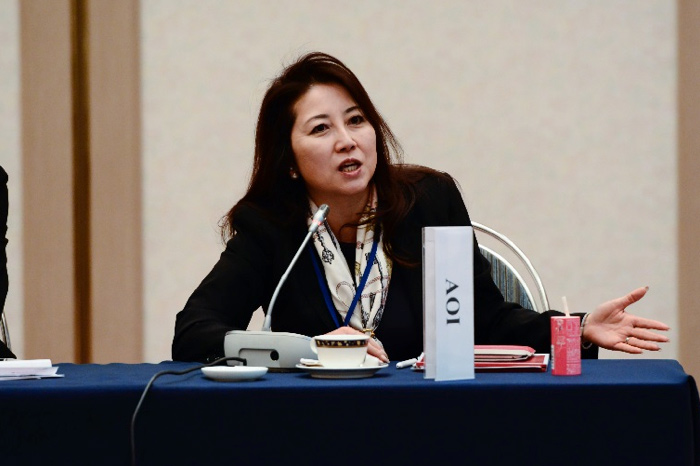
Professor Aoi has delivered a presentation entitled Stabilisation as a Security Agenda: Western Policy-Making Dilemmas, in which she underscored a number of key ideas concerning the task of stabilisation within the framework of international missions. Professor Aoi has provided an overview of the complex task entailed by defining stabilisation in a comprehensive way, against the background of competing definitions put forward by several authorities. Eventually, she identified four key features, namely the primacy of political purpose (1), the lack of, or divided or fluid nature of consent from the strategic actors (2), the kind of approach adopted by the campaign authority (3), and finally the nature of stabilisation as a process, not simply as a set of activities (4). Professor Aoi has then proceeded with the illustration of the main misconceptions and implementation difficulties of stabilisation, finally highlighting the dilemmas faced by Western policies in this regard.
Session III: The Economy-Security Nexus
The session was moderated by Keisuke Iida, Professor at the Graduate School of Law and Politics of the University of Tokyo, who introduced the speakers, namely T.J. Pempel, Jack M. Forcey Professor of Political Science at the Department of Political Science, University of California (Berkeley), and Christina Davis, Professor at the Department of Politics and the Woodrow Wilson School of Public and International Affairs, Princeton University.
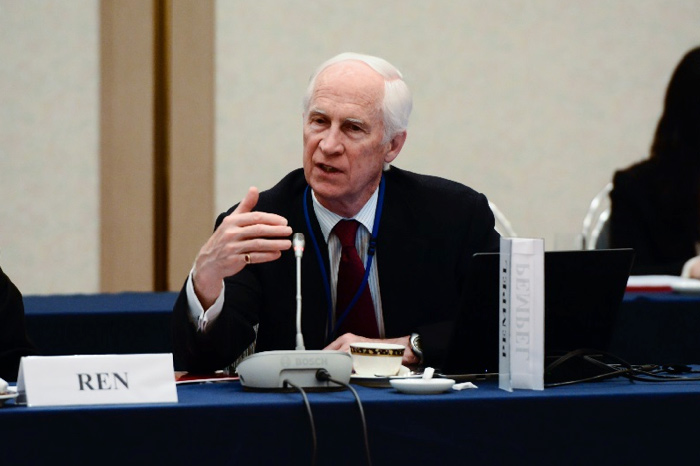
Professor Pempel started his contribution by describing the historically intimate relation between a country’s economy and its security policies. On the one hand, security questions are often dealt with in ways designed to favour economic development; on the other, economic issues can rapidly become matters of national security. In East Asia, after the end of the Vietnam War most states have been able to focus almost exclusively on economic development, accepting more or less implicitly the status quo on the security front. A paradoxical situation has become more visible in the past two decades: following the Asian Crisis of 1997, East Asian nations have sought and achieved collectively higher levels of economic development, aided by significantly higher levels of both institutional cooperation on economic matters, and economic-financial integration and interdependence. However, despite such integration economically, security concerns have also re-surfaced, with a worrying crescendo after 2008-2009, largely revolving around territorial disputes, the historical memories of WWII, and the controversial interpretation of behaviour during the Japanese Imperial Age (1895-1945). Such concerns can no longer be considered of secondary importance, and they are triggering a shift in the governments’ agendas, moving them away from an exclusive focus on questions of economic development to the broader picture of the economy-security nexus.
Professor Davis explored in her intervention a number of topics related to the question of the link between security and economic policies. She discussed how theories of commercial peace, according to which trade would work in favour of the maintenance of peace, still have found no conclusive evidence nor explanation of the causal mechanisms. She introduced a paper in which she explores a possible link between trade interdependence and the propensity to resolve international disputes by bringing them to the International Court of Justice (ICJ). Despite the evidence that trade makes states more likely to use law to resolve their disputes, there is also concern about whether some political controversies show the reverse mechanism where political controversies and conflicts can lead to significant damage to trade relations. She noted that this may especially be true for countries where state-own companies play an important role in international trade, and can immediately respond to directives imparted by the political leadership. In the typical case of China-Japan relations, in contrast to short and symbolic boycott actions, more recent disputes in the past few years seem to have brought about a negative trend in investment and trade.
DAY 2, 31st January 2015
The second day of the workshop saw two closed sessions, and a session in the afternoon which was open to the public.
Session I: De-Escalating Territorial Conflicts
The first session of the second day was chaired by Professor Chung Min Lee, Dean of the Graduate School of International Studies, Yonsei University (Seoul), who introduced as speakers Zhu Feng, Professor and Executive Director of the China Center for Collaborative Studies of the South China Sea, Nanjing University, Professor Ren Xiao, Director of the Center for the Study of Chinese Foreign Policy at the Institute of International Studies, Fudan University (Shanghai), and finally Dr. Akihiko Tanaka, President of the Japan International Cooperation Agency.
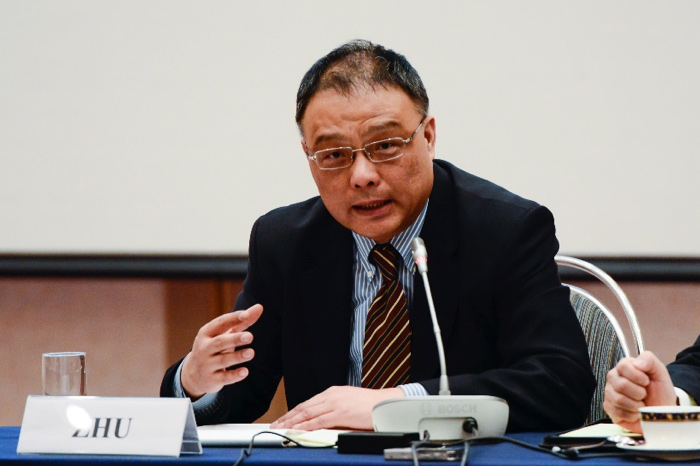
Professor Zhu thanked the organisers of the event and Professor Lee for the kind introduction, before proceeding to discuss the matter of de-escalation of international tensions in East Asia, particularly between China and Japan. He stressed the importance of the historical context as an inseparable background for the understanding of why such controversies have risen, and of how particularly China has shaped its diplomatic and even defence posture. The point is here that China, coming from an era of acute weakness and foreign intervention, is currently resolute to show to other actors that Beijing will not return to a weak position on the international stage. While this can lead to misunderstandings and it can be perceived as aggressive, from a Chinese viewpoint and in the wake of history, the current stance appears to be largely justified. Professor Zhu also highlighted how China is showing both flexibility and resilience in relation to the South China Sea maritime disputes, stressing the importance of pressures coming from the Chinese domestic audiences. In terms of measures to seek de-escalation, he articulated the view that on the Diaoyu/Senkaku Islands dispute, de-escalation chances depend largely on the will of leaders on both sides to achieve some kind of political solution, but unfortunately the risk that such dispute will be instead exploited for domestic reasons looms large. Finally, Professor Zhu stressed the importance, for practitioners and academics alike, to work together in order to develop a method for the handling of such disputes, in order to avoid mistakes which can lead to further degradation of international relations.
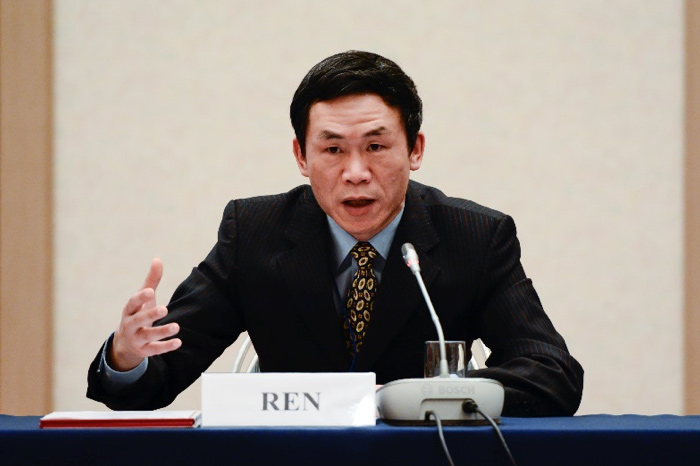
Professor Ren started his intervention by summarising the situation of the China-Japan relations, which are now back to a “new norm” after the top leadership met in Beijing in November last year, on the occasion of the APEC meeting. He has recalled how that meeting was the most evident sign of a recovery in China-Japan relations, which has seen the resumption of bilateral contacts at high-level, before and after the Beijing handshake. In the context of this diplomatic recovery, it is however difficult to deny that numerous questions remain open, which have to be captured within the changing environment of global politics and, particularly for East Asia, by the rise of China and the reduced regional role of Japan. Professor Ren has here recalled that Japan, once the only industrialised country in this part of the world, has now to adjust to new realities. From a Chinese perspective, Japan is and remains a very important neighbour, and a key factor in shaping China’s immediate external environment. But bilateral relations remain negatively conditioned first of all by the question of historical memories and by the way in which some themes are handled by Japanese politics, from a Chinese perspective. Professor Ren has finally remarked that it will be important how the Japanese government will address the world this year in the occasion of the 70th anniversary of the war’s end.
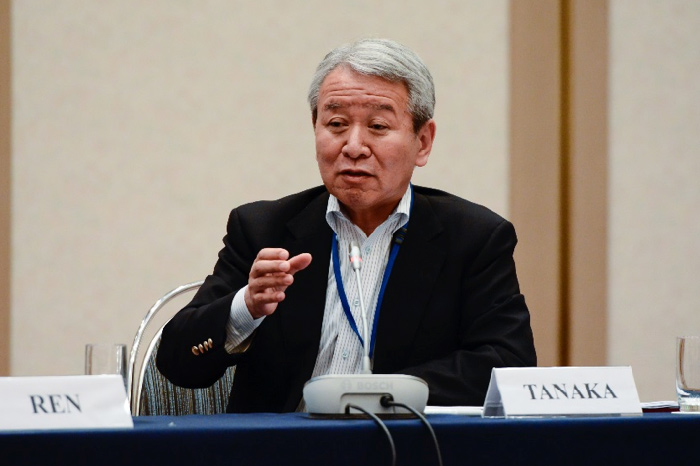
Dr. Tanaka has focused his speech on the possible strategies and mechanisms for the de-escalation of international territorial disputes. As the Japanese government does not acknowledge the existence of a dispute on the Senkaku Islands, it considers as disputes only the one with the Republic of Korea over the Takeshima/Dokdo and the major one with Russia on the Northern Territories, although the political meaning of the controversy with China over the Senkaku cannot be underestimated. On the point of de-escalation, Dr. Tanaka envisaged three main ways to achieve such goal, namely the conclusion of some sort of agreement, or shifting the attention onto other issues, or focusing on cooperative initiatives. In terms of bilateral relations with China, an agreement seems to be particularly difficult to reach because of insufficient trust at leadership level, and contrasting views on the other side’s move, as in the case of how Beijing’s leadership has interpreted Tokyo’s nationalisation of the Senkaku islands as an aggressive behaviour, while the Japanese government intention was precisely the opposite. Despite these frictions, it is possible to continue cooperation in many other fields, and this has actually taken place even during the recent crises, when indeed the Japan International Cooperation Agency (JICA) has continued to operate in China, especially in areas of technical and medical cooperation. Finally, Dr. Tanaka has expressed the wish that the two countries may further overcome mistrust by focusing on fostering even more cooperation. This may become possible in the field of coordinating international aid efforts, as China is now rapidly becoming a major ODA (official development assistance) provider, but also in academic exchange and cooperation, and in the enhancement of tourist flows.
Session II: The Future of International Order
The second session was chaired by G. John Ikenberry, Albert G. Milbank Professor of Politics and International Affairs at the Department of Politics and the Woodrow Wilson School of Public and International Affairs, Princeton University. Professor Ikenberry introduced the speakers for this panel, namely Professor Fujiwara, John Swenson-Wright, Senior Lecturer at the University of Cambridge, and Evelyn Goh, Shedden Professor of Strategic Policy Studies, College of Asia and the Pacific, Australian National University.
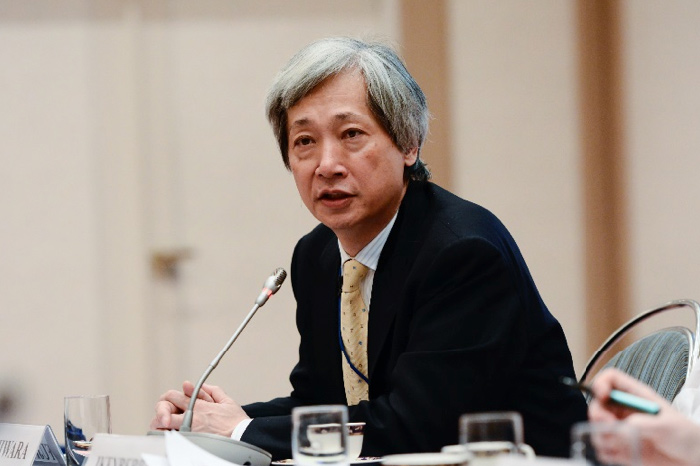
Professor Fujiwara introduced his talk by observing that the post-1991 liberal international order is a state of crisis, if not openly falling apart. In the first decade after the collapse of Soviet communism there was a great deal of optimism about the future trajectory of global politics, which was largely justified by the end of the global nuclear war threat, possibly the single most important achievement of that historical turn. Another feature of the post-Cold War order was the establishment of a political environment hostile to open military intervention. Today we can observe a series of disturbing large scale phenomena, particularly the intense power competition between major capitalistic democracies and emerging powers such Russia and China on the one hand, and the spread of asymmetric security threats as by-product of severe state fragility or outright collapse. The initial optimism has left the place to a somewhat pessimistic view of the coming future, one which may be characterised by the re-appearance of wars at local level, of political instability in emerging democracies, of neo-nationalism, and by the intensification of ethnic-religious conflicts. The current power transition in favour of non-liberal powers such as China and to a certain extent Russia opens scenarios of uncertainty with relation to the intentions of such actors and consequently of the overall directions of events. Finally, Professor Fujiwara suggested that, with the view to preserve at least a modicum of international order, efforts should be concentrated on the de-escalation of low-intensity conflicts, on arms control and conflict resolutions, on enhancing the security of fragile states. At a theoretical level, it would be important to consider whether a form of prudent realism may be the best approach to the emerging global political landscape.
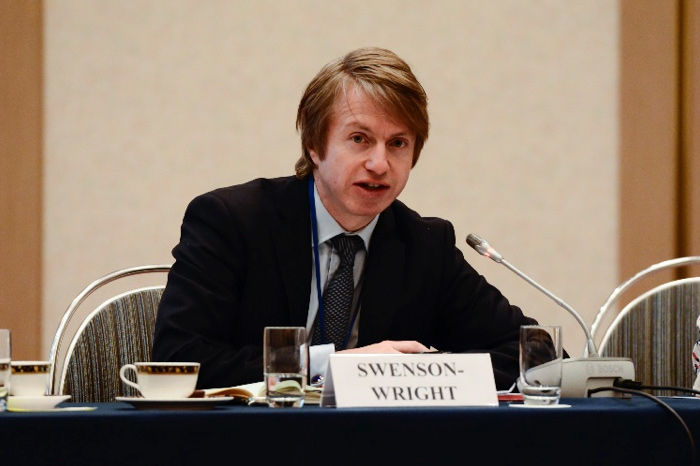
Professor Swenson-Wright delivered a reflection on possible parallels between the Helsinki process in European politics during the 1970s and the current international political situation in East Asia. Despite the existence of a number of similarities, it appears unlikely, albeit not impossible, that a process of rapproachement under the sign of something similar to the “Helsinki spirit” may take place in this part of the world. The reasons for this are to be found in a number of elements, such as the less homogeneous diplomatic and military posture of the two main “blocs”, the different conceptions of international order in the US and in China, the US unwillingness and/or inability to think strategically about a long term solution for the region’s problems, and finally the spread of political populism in the form of domestic exploitation of external tensions for consensus-building purposes. On the specific case of Japan however, Professor Swenson-Wright indicated some positive elements, revolving primarily around Prime Minister Abe’s recent electoral success, which has led to the reaffirmation of a “proactive pacifism” policy. While it is early to judge the overall impact of Abe’s foreign policy, the current administration seems to be aware of the necessity to improve the diplomatic situation. Finally, Professor Swenson-Wright suggested a number of possible measures to enhance regional cooperation, with particular reference to confidence-building, and specifically for Japan, he expressed the wish to see more internationalisation and a more “proactive reconciliation” policy with neighbouring countries.
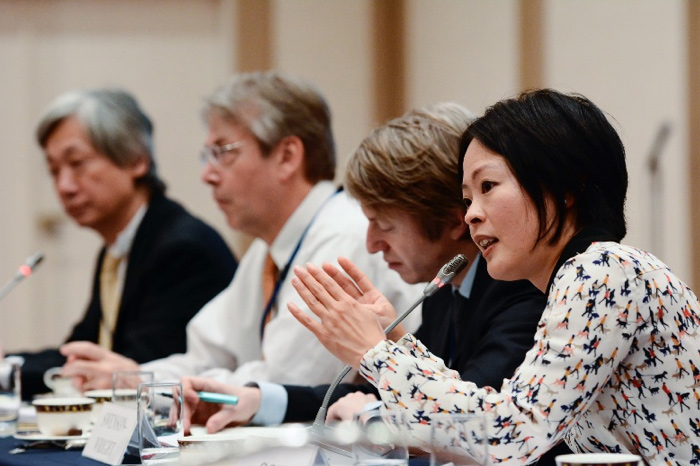
Professor Goh analysed in her intervention the evolution of the international order in East Asia, which has not manage to evolve from its post-Cold War dichotomic structure to some sort of regional integration. Indeed, regional integration appears problematic because of the historical China-Japan rivalry, which has marked the international relations in East Asia from the beginning of the modern era, since both countries abandoned previous policies of isolation. In the post-WWII context, the US involvement as a key security provider and major economic player has de facto accepted such division. Even in the context of a rapidly changing scenario characterised by a shift in regional and global power in favour of China, still the old structures of the US-led liberal international order remain in place. This is not only true for the basic economic-financial architecture of the world, which would be too costly to replace with some hegemonic institutions of a new sort, but also in terms of security provisions. Despite being often portrayed as a “declining” power, the demand for US-provided security not only remains high, but appears to be rising in the face of an unclear Chinese strategy. Such a situation is paradoxically reinforcing the hierarchical order which sees the US as the regional hegemon. Looking at the future however, it appears rather clear, Professor Goh argued, that the regional order will be reshaped mirroring a strengthened position of China, which makes a mutual adjustment and accommodation necessary between Washington and Beijing, with the difficult task of finding a satisfactory middle level hierarchy, particularly concerning the position of Japan.
Public Session: Towards Common Security in East Asia
The public sessions of the Workshop on the Future of Security In Asia took place on Saturday January 31st, 2015 at the Shinagawa Prince Hotel (Shinagawa, Tokyo) from 14:30 to 16:30, under the title Towards Common Security In East Asia. It saw the participation of outstanding international politics scholars: Professor G. John Ikenberry (Princeton University), Chung Min Lee (Yonsei University), Jia Qingguo (Peking University), and Professor Kiichi Fujiwara (University of Tokyo).
The session was chaired by Professor Fujiwara, who presented the guests to the speakers and illustrated the main points raised during the various sessions of the workshop, which revolved mainly about the problematic re-definition of a concept of security in the changing environment of international politics, particularly in the light of shifting power relations, fragile states and asymmetric threats, complex economic interdependence, re-emergence of nationalism and territorial disputes. For this session, Professor Fujiwara invited the speakers to focus on possible efforts to achieve a more stable system of common security in the East Asian region.
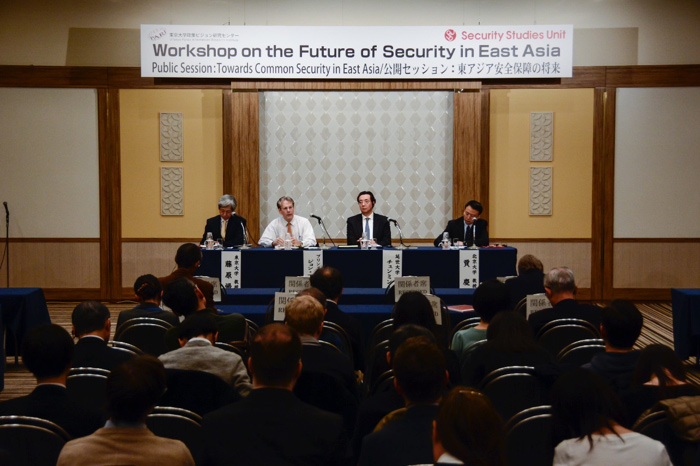
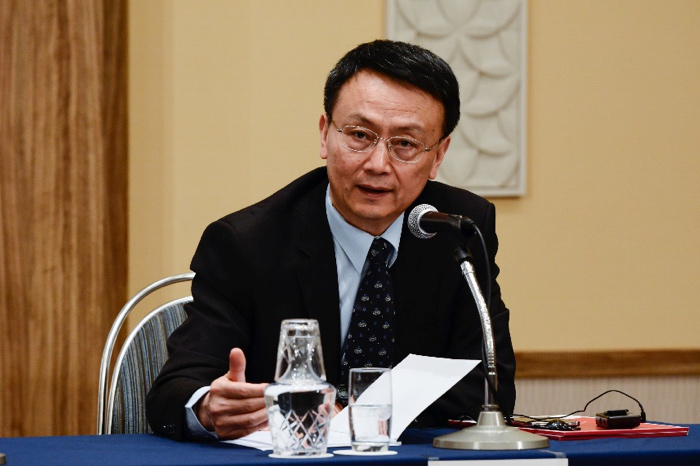
Professor Jia Qingguo started his speech by identifying the major security challenges to the region, when “security” is understood in traditional ways. The first issue is the present and future of the US-China relations. According to classical theories of international politics, the relationship between a rising and a declining power may easily end up in military conflict and war. Greek historian Thucydides identified the causes of the Peloponnesian War (431-404 BCE) between Sparta and Athens as the change in “balance of power” between the two and the fear that the Spartans felt about the rise of Athens. Some authors are arguing this is happening today between the US and China. The second issue pertains maritime disputes, both between China and Japan, and in the South China Sea. Those disputes are re-surfacing old problems, not necessarily new ones. The third issue is the Korean problem, both in its nuclear component, and in the more general North-South hostility. Forth, one finds the inadequacy of the current regional security structure. Particularly for this last point, three elements have to be highlighted, namely 1) the general structure appears to be fixed in a dyadic way, with the US and its allies and on the one side, Russia and China on the other: this structure seems to encourage rivalry; 2) it is too dependent on US politics; and 3) both Russia and China feel marginalised in the current regional order.
To address these challenges, China has proposed to the US that they should develop a new type of great power relations. Washington has responded positively but for various reasons the progress has been short of expectations. Despite hilarious press reports, China has been following a policy of self-restraint on maritime disputes. On the Korean problem, China has been trying to bring Pyongyang back to the Six-Party-Talk.
On what to be done to ease international tensions, Professor Jia argued that the various actors should engage more cooperation on concrete problems, especially on those with a less immediate political dimension, such as in the case of climate change. This can in the long term yield confidence among the leaderships. Maritime disputes have to be dealt with restraint and consultation on military manoeuvres, and on the particular point of the Diaoyu/Senkaku Islands, he argued that it would be perhaps sensitive to go back to Deng Xiaoping’s idea of joint natural resources exploitation. On Korea, it would be important to continue with efforts to push for denuclearization, while also engaging in discussions on contingency plans for emerging crises. Finally, international actors should work together to enhance multilateral security cooperation in the region.
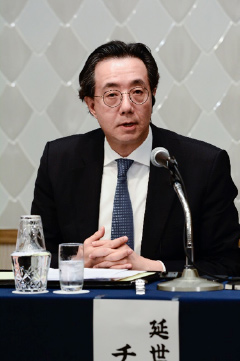
Professor Lee thanked Professor Fujiwara together with the organisers and sponsors of the workshop. He referred to the current situation in this region of the world as the “Asian Paradox”, whereby, despite the great success of economic growth policies in the last few decades, security questions continue to loom and their severity is in several cases increasing overtime. Professor Lee identified a number of challenges for Asia in the upcoming future decades: 1) He has called Asia “the department store of the world’s security challenges”, i.e. the region of the world were all sorts of security questions are present, namely the existence of the largest militaries, of the largest economic powers, of WMD proliferation, territorial disputes, and rampant military expenditures, particularly in China. 2) Domestic politics also offer a greatly dis-homogeneous picture, with many kinds of regimes: communist, democratic, in transition. Such political landscape entails a number of security risk deriving from the questionable political stability of many regimes. 3) With current trends, the region will suffer from a very severe ageing of the population from here to 2050 and beyond, while certain nations in South East Asia will see a huge population increase. The management of such demographic transition will be very difficult. 4) The emergence and proliferation of a number of unorthodox security questions and threats, particularly evident in the case of cybersecurity. How would it be possible to overcome the “Asian paradox”? On the one hand a great exercise in handling political leadership carefully, both domestically and at international level is needed. On the other, it is important to start thinking about the kind of legacy which the current generation of leaders leave to the next generation, and how this latter should be prepared to meet upcoming challenges, and particularly historical divisions among Asian nations.
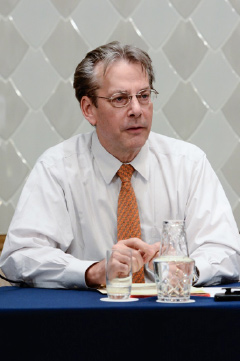
Professor Ikenberry thanked Professor Fujiwara, the organisers and sponsors of the workshop. He began his intervention by providing some broad observations on the East Asian region, which is characterised by economic success, but also by worrying international disputes, with a potential for escalation into severe crises. How can these two regional dynamics work together, i.e. in other words, how can complex interdependence lead to the strengthening of cooperation and the easing of power competition? Professor Ikenberry singled out three main problems for the future of the region. a) From a security perspective, North Korea is the most important threat, and there is now considerable concern about the regime’s ability to miniaturise their nuclear weapons, which could be per se a security game changer. b) The regional and possibly global order is in a phase of transition from a US-led hegemonic order to a partial multipolar one, largely as a consequence of China’s rise, a new order which also encompasses new actors such as India and Australia. c) To take this change a step further, the region is developing a double hierarchy: a security hierarchy, dominated by the US alliance system, and an economic hierarchy, with China in a central position, as it became in recent years the main trading partner of almost all countries in Asia. Particularly on this last point, Professor Ikenberry has remarked that it is unclear at the moment how this dual hierarchy will operate, and that this will depend on the choices made by the various actors. This dual system is likely to stimulate more competition between the two great powers, but it will also have other consequences. Firstly, it will put regional middle powers in front of difficult choices, while many actors in reality do not intend to be forced to a choice of exclusive loyalty to one side. Secondly, the US is likely to continue to promote stability, as it is not in the US interest to destabilise the strategic balance in the region. Third comes the particular position of China, which is currently facing old dilemmas many historians have often underscored concerning rising powers. Indeed, the sheer rise of a great power can awake feelings of suspicion or even fear in the neighbours, thus producing its self-encirclement. In order to avoid confrontation and ease tensions, the region and the world at large will need very high quality diplomatic effort, and a certain dose of good luck.
Finally Professor Fujiwara remarked that while there are no sign that states in East Asia intend to start a war, there is always the risk that skirmishes around particular flashpoints may degenerate, and such risk shall not be underestimated. For this reason, it is important to strengthen consultation mechanisms at diplomatic and technical level with a view to prevent and manage possible crises. While it appears that governments are trying to avoid confrontation, on the other hand nationalistic rhetoric creates an unfavourable political landscape.
